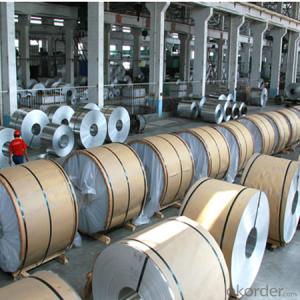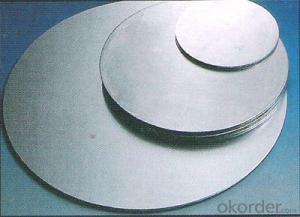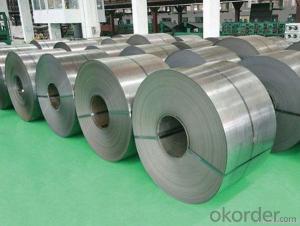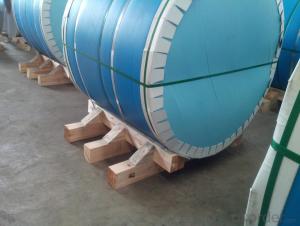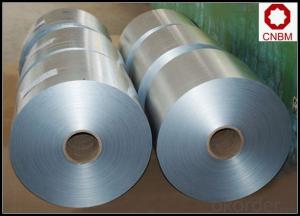High Quality CC Mill Finished Aluminum Coil Slitter
- Loading Port:
- Shanghai
- Payment Terms:
- TT OR LC
- Min Order Qty:
- 5 m.t.
- Supply Capability:
- 10000 m.t./month
OKorder Service Pledge
OKorder Financial Service
You Might Also Like
Specification
1. Specification of CC Mill Finished Aluminum Coil with High Quality
Material | Alloy Aluminum 6063,6061,6005 or customer nominated |
Temper | T3, T4, T5, T6 |
Surface | Anodize, electrophoresis, powder coating, PVDF coating, wood grain painting, matted, etc. |
Colour | Any colour based on Standard Germany RAL Mark |
Length | Coating 6.5 meters, Anodizing 6.5 meters, Mill finish 5 meters |
Press Machine | 500-4000 tons all together 64 press lines. |
Fabrication | 1. Windows and doors; 2. Drilling; 3. Bending; 4. Cutting; 5. etc. |
Certificate | ISO 9001 |
Moulding | 1. Using our moulds, no fee; |
2. Using customer drawing, opening mould, usually about 10~50 tons then the moulding can be refunded. | |
3. Mould cost is negotiable base on the order quantity | |
Capability | Annual output 100,000 tons |
2. Application of CC Mill Finished Aluminum Coil with High Quality
(1).Interior: wall cladding, ceilings, bathrooms, kitchens and balconies, shutters, doors...
(2).Exterior: wall cladding, facades, roofing, canopies, tunnels,column covers , renovations...
(3).Advertisement: display platforms, signboards, fascia, shop fronts...
3. Feature of CC Mill Finished Aluminum Coil with High Quality
*Such coil is specially designed to replace aluminum ingot, due to the high export tax of aluminum ingot, the coil has better price than ingot.
*This type of coil can fit customer's remelting furnace just like ingot, no need to make any change to the production line that was previously used for ingot. The standard coil size and weight is very suitable for the feed gate of furnace.
*This type of coil causes less material wastage than ingot when remelted.
*Our coil is made directly from ore, no need to go though the ingot making process, quality is much better than other suppliers who use ingot scrap to make coil.
Be free from Oil Stain, Dent, Inclusion, Scratches, Stain, Oxide Dicoloration, Breaks, Corrosion, Roll Marks, Dirt Streaks and other defect which will interfere with use
4. Certificate:
SGS and ROHS(if client request, paid by client), MTC(plant provided), Certificate of Origin(FORM A, FORM E, CO), Bureau Veritas and SGS (if client request, paid by client), CIQS certificate
5. Image of CC Mill Finished Aluminum Coil with High Quality
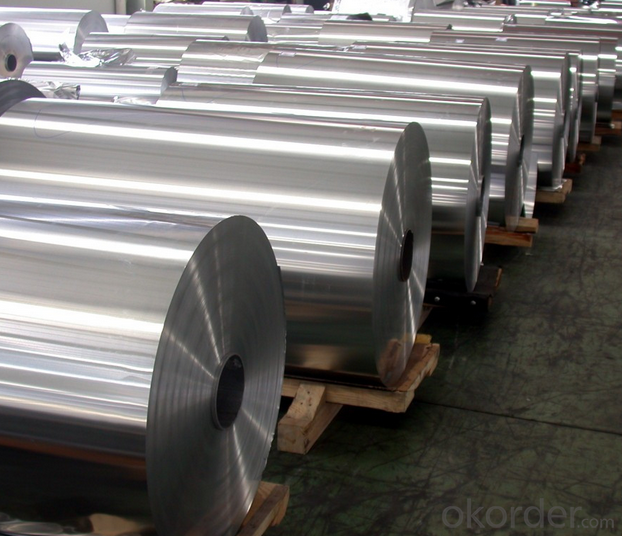
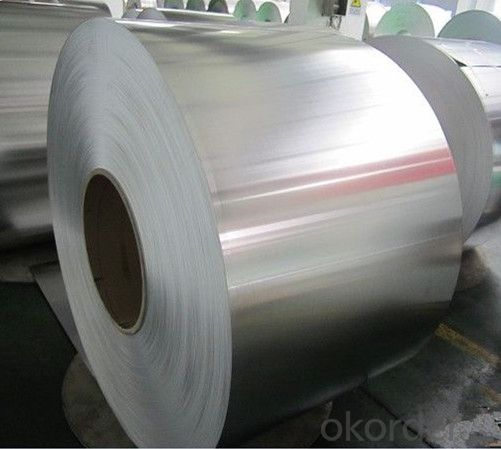
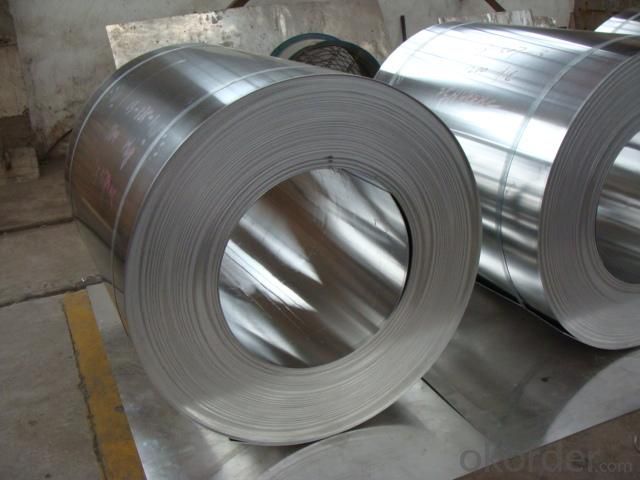
6. Package and shipping of PVEF Color Coating Aluminum Coil with High Quality
eye to wall
eye to the wall
with wood pallet (wooded case also available)
7. FAQ
1) What is the delivery time?
Dpends on actual order, around 20 to 35 days
2)What is the QC system:
We have QC staff of 20 persons and advanced equipment, each production is with MTC traced from Aluminum ingot lot.
3) What market do you mainly sell to?
Australia, America, Asia, Middle East, Western Europe, Africa etc
- Q: Are aluminum coils suitable for solar reflectors?
- Indeed, solar reflectors can indeed be made using aluminum coils. Aluminum, being highly reflective and durable, is extensively employed as a material for solar reflectors. Its reflective surface effectively redirects sunlight towards the intended destination, be it a solar panel or collector. Moreover, the lightweight and malleable nature of aluminum coils make them perfect for crafting curved or angled reflector surfaces. The reflective coating on these coils is also capable of enduring harsh weather conditions, ensuring long-lasting functionality. All in all, aluminum coils are an exceptional option for solar reflectors, given their reflectivity, durability, and adaptability.
- Q: How to pull the aluminum coil purchased into aluminum sheet?
- You can buy flat sheet directly next time to avoid trouble.
- Q: This question asks for methods to check if an aluminum coil has been damaged during the transportation process.
- <p>To determine if an aluminum coil is damaged during transportation, inspect it visually for any dents, scratches, or deformations. Check for any signs of rust or corrosion, which could indicate exposure to moisture. Ensure the coil is clean and free from any foreign materials that might have adhered during transit. Use a magnetic particle inspection or dye penetrant testing for more detailed internal and surface inspections, especially if the damage is not visible. Additionally, measure the coil's dimensions to ensure they are within the specified tolerances. If the coil is part of a shipment, also review the transportation records for any incidents that might have caused damage.</p>
- Q: Are aluminum coils suitable for automotive heat shields?
- Indeed, automotive heat shields can indeed be made using aluminum coils. Aluminum, owing to its exceptional heat resistance and thermal conductivity characteristics, is extensively employed in the automotive sector. Its lightweight nature and remarkable strength-to-weight ratio render it a perfect option for heat shields. Through the utilization of aluminum coils, heat dissipation can be effectively achieved, thereby safeguarding delicate components from excessive heat exposure. Moreover, aluminum exhibits corrosion resistance, a vital attribute for automotive applications, given the exposure of heat shields to diverse environmental conditions. In conclusion, aluminum coils provide the essential properties and performance needed for automotive heat shields.
- Q: Are aluminum coils suitable for architectural cladding applications?
- Yes, aluminum coils are suitable for architectural cladding applications. Aluminum is a versatile material that offers a range of benefits for cladding purposes. Firstly, aluminum is lightweight, making it easy to handle and install. This reduces the overall weight on the building structure and simplifies the construction process. Additionally, aluminum is highly durable and resistant to corrosion. This makes it an ideal choice for exterior applications, as it can withstand harsh weather conditions and maintain its appearance over time. Furthermore, aluminum coils can be fabricated into various shapes and sizes, allowing for flexibility in design. They can be easily formed, cut, and shaped to meet the specific requirements of the building project. Aluminum is also available in a wide range of finishes and colors, providing architects and designers with ample options to achieve the desired aesthetic for the cladding. Moreover, aluminum is a sustainable choice as it is 100% recyclable. This aligns with the growing focus on environmentally friendly construction practices. Overall, the versatility, durability, lightweight nature, and aesthetic options make aluminum coils a suitable choice for architectural cladding applications.
- Q: Are aluminum coils suitable for marine environments?
- Yes, aluminum coils are suitable for marine environments. Aluminum has excellent corrosion resistance properties, making it a popular choice for marine applications. It forms a protective oxide layer that prevents further corrosion, making it ideal for withstanding the harsh saltwater and humid conditions found in marine environments. Additionally, aluminum coils are lightweight, durable, and easy to maintain, making them a reliable option for marine applications.
- Q: should i have a paper between aluminum siding and the wood
- Aluminum siding can be vented with round pop-in perforated vent plugs, these are very easy to install. I would really like to know how do you know there is condensation behind your siding?
- Q: What is the typical lead time for manufacturing aluminum coils?
- The typical lead time for manufacturing aluminum coils can vary depending on various factors such as the complexity of the order, the quantity required, and the current demand in the market. However, on average, it can range from a few weeks to a couple of months.
- Q: What are the different coil winding options available for aluminum coils?
- Aluminum coils offer several coil winding options to choose from. These options include: 1. Single-layer winding: This basic winding option involves winding the wire around the coil in a single layer. It is ideal for applications with limited space and the need for efficient cooling. 2. Double-layer winding: This option involves winding two layers of wire on top of each other. It provides improved heat dissipation and allows for higher power handling. 3. Concentric winding: With concentric winding, the wire is wound in concentric circles, each with a slightly different diameter. This type of winding reduces the overall size of the coil while maintaining high inductance. 4. Litz wire winding: Litz wire is composed of individually insulated strands. This winding option minimizes skin effect and reduces power loss due to high-frequency currents. It is commonly used in high-frequency applications. 5. Toroidal winding: Toroidal winding creates a circular shape for the wire, forming a toroidal coil. This type of winding offers better containment of the magnetic field and reduces electromagnetic interference. 6. Layered winding: Layered winding involves winding the wire in multiple insulated layers. It is used when a compact space requires a high number of turns. 7. Sectional winding: Sectional winding divides the coil into different sections and winds each section separately. This allows for better control over magnetic flux distribution and reduces losses. Each coil winding option has its own advantages and is suitable for different applications based on factors such as power handling capacity, size constraints, and frequency requirements.
- Q: The user is asking if it's safe to use aluminum coil for food preparation in a microwave oven.
- <p>No, you should not use aluminum coil for food preparation in a microwave oven. Aluminum is a metal and can cause sparks or even a fire when exposed to the microwave's electromagnetic field. It can also reflect microwaves, potentially damaging the oven. Always use microwave-safe materials such as glass, ceramic, or microwave-safe plastic containers for food preparation in a microwave.</p>
Send your message to us
High Quality CC Mill Finished Aluminum Coil Slitter
- Loading Port:
- Shanghai
- Payment Terms:
- TT OR LC
- Min Order Qty:
- 5 m.t.
- Supply Capability:
- 10000 m.t./month
OKorder Service Pledge
OKorder Financial Service
Similar products
Hot products
Hot Searches
Related keywords
